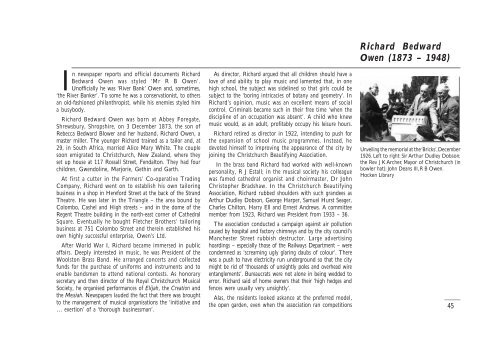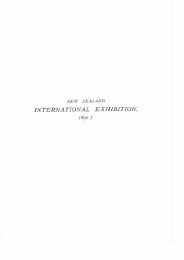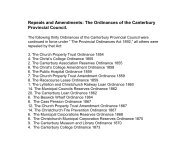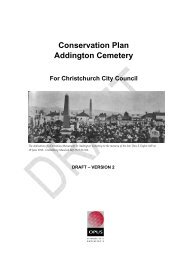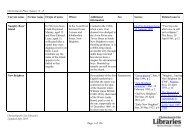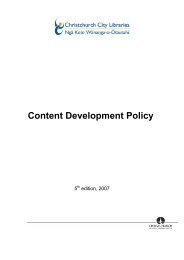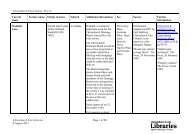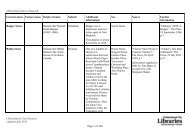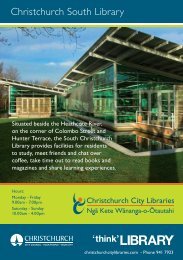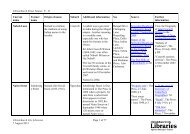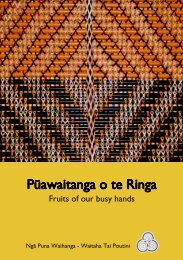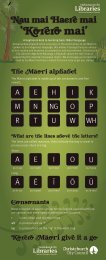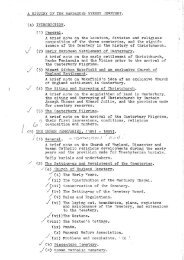Rich man, poor man, environmentalist, thief - Christchurch City ...
Rich man, poor man, environmentalist, thief - Christchurch City ...
Rich man, poor man, environmentalist, thief - Christchurch City ...
You also want an ePaper? Increase the reach of your titles
YUMPU automatically turns print PDFs into web optimized ePapers that Google loves.
In newspaper reports and official documents <strong>Rich</strong>ard<br />
Bedward Owen was styled ‘Mr R B Owen’.<br />
Unofficially he was ‘River Bank’ Owen and, sometimes,<br />
‘the River Banker’. To some he was a conservationist, to others<br />
an old-fashioned philanthropist, while his enemies styled him<br />
a busybody.<br />
<strong>Rich</strong>ard Bedward Owen was born at Abbey Foregate,<br />
Shrewsbury, Shropshire, on 3 December 1873, the son of<br />
Rebecca Bedward Blower and her husband, <strong>Rich</strong>ard Owen, a<br />
master miller. The younger <strong>Rich</strong>ard trained as a tailor and, at<br />
29, in South Africa, married Alice Mary White. The couple<br />
soon emigrated to <strong>Christchurch</strong>, New Zealand, where they<br />
set up house at 117 Rossall Street, Fendalton. They had four<br />
children, Gwendoline, Marjorie, Gethin and Garth.<br />
At first a cutter in the Farmers’ Co-operative Trading<br />
Company, <strong>Rich</strong>ard went on to establish his own tailoring<br />
business in a shop in Hereford Street at the back of the Strand<br />
Theatre. He was later in the Triangle – the area bound by<br />
Colombo, Cashel and High streets – and in the dome of the<br />
Regent Theatre building in the north-east corner of Cathedral<br />
Square. Eventually he bought Fletcher Brothers’ tailoring<br />
business at 751 Colombo Street and therein established his<br />
own highly successful enterprise, Owen’s Ltd.<br />
After World War I, <strong>Rich</strong>ard became immersed in public<br />
affairs. Deeply interested in music, he was President of the<br />
Woolston Brass Band. He arranged concerts and collected<br />
funds for the purchase of uniforms and instruments and to<br />
enable bandsmen to attend national contests. As honorary<br />
secretary and then director of the Royal <strong>Christchurch</strong> Musical<br />
Society, he organised perfor<strong>man</strong>ces of Elijah, the Creation and<br />
the Messiah. Newspapers lauded the fact that there was brought<br />
to the <strong>man</strong>agement of musical organisations the ‘initiative and<br />
… exertion’ of a ‘thorough business<strong>man</strong>’.<br />
As director, <strong>Rich</strong>ard argued that all children should have a<br />
love of and ability to play music and lamented that, in one<br />
high school, the subject was sidelined so that girls could be<br />
subject to the ‘boring intricacies of botany and geometry’. In<br />
<strong>Rich</strong>ard’s opinion, music was an excellent means of social<br />
control. Criminals became such in their free time ‘when the<br />
discipline of an occupation was absent’. A child who knew<br />
music would, as an adult, profitably occupy his leisure hours.<br />
<strong>Rich</strong>ard retired as director in 1922, intending to push for<br />
the expansion of school music programmes. Instead, he<br />
devoted himself to improving the appearance of the city by<br />
joining the <strong>Christchurch</strong> Beautifying Association.<br />
In the brass band <strong>Rich</strong>ard had worked with well-known<br />
personality, R J Estall; in the musical society his colleague<br />
was famed cathedral organist and choirmaster, Dr John<br />
Christopher Bradshaw. In the <strong>Christchurch</strong> Beautifying<br />
Association, <strong>Rich</strong>ard rubbed shoulders with such grandees as<br />
Arthur Dudley Dobson, George Harper, Samuel Hurst Seager,<br />
Charles Chilton, Harry Ell and Ernest Andrews. A committee<br />
member from 1923, <strong>Rich</strong>ard was President from 1933 – 36.<br />
The association conducted a campaign against air pollution<br />
caused by hospital and factory chimneys and by the city council’s<br />
Manchester Street rubbish destructor. Large advertising<br />
hoardings – especially those of the Railways Department – were<br />
condemned as ‘screaming ugly glaring daubs of colour’. There<br />
was a push to have electricity run underground so that the city<br />
might be rid of ‘thousands of unsightly poles and overhead wire<br />
entanglements’. Bureaucrats were not alone in being wedded to<br />
error. <strong>Rich</strong>ard said of home owners that their ‘high hedges and<br />
fences were usually very unsightly’.<br />
Alas, the residents looked askance at the preferred model,<br />
the open garden, even when the association ran competitions<br />
<strong>Rich</strong>ard Bedward<br />
Owen (1873 – 1948)<br />
Unveiling the memorial at the ‘Bricks’, December<br />
1926. Left to right: Sir Arthur Dudley Dobson;<br />
the Rev J K Archer, Mayor of <strong>Christchurch</strong> (in<br />
bowler hat); John Deans III, R B Owen.<br />
Hocken Library<br />
45


